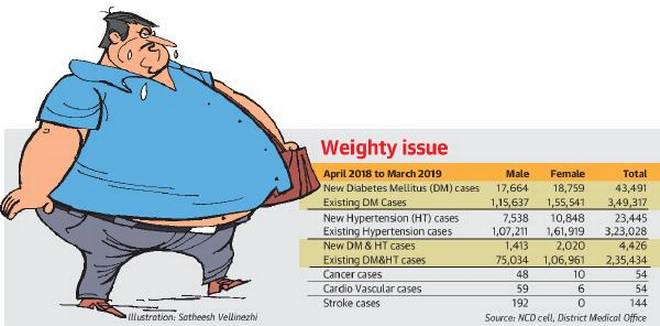Source: thehindu.com
The district health authorities have brought out a special patient book with a menu card for preventing overweight and obesity.
The initiative is a part of a campaign against non-communicable diseases (NCDs). The programme, first of its kind in the State, is in the process of getting implemented in all NCD clinics in the district.
According to Dr. K.R. Vidya, deputy district medical officer who is heading the NCD cell, the preventive action consists of food therapy and exercises, and there is no medication. “It is for those who volunteer for the therapy,” she said. However, those who are diagnosed with diabetes and hypertension are provided medication.
Those identified as overweight and obese are referred to the NCD clinics for the therapy. A registration book and a patient book are maintained for those coming in. The patient book contains menu cards with different combination of foods to be taken every day.
“We have set the menu card for 1,500 kilo calories as the daily intake,” said Dr. Vidya.
Patients who come for the therapy need to follow the menu that is set for Monday to Sunday. Jotting down on the foods in the book will help follow the extra intake each day. People who register for the therapy have to consult the doctor after a week’s programme and then regularly every month.
After the initiation into the food therapy, exercises would also be suggested for weight loss.
The district has added 43,491 new diabetes patients in 2018-19 to the already registered 3.49 lakh patients on a follow-up programme. The year also saw an addition of 23,445 new hypertension patients to the existing 3.23 lakh patients.
This year, 4,426 patients having both diabetes and hypertension were added to the existing 2.35 lakh patients.
While females were more in numbers for diabetes, hypertension and a combination for both, more males were detected with cardiovascular diseases and stroke.
As part of preventive activities, 76,570 people, which included 34,415 males, were given counselling against tobacco use, while 1,75,337 were counselled for preventive NCD and health.
